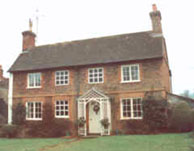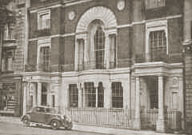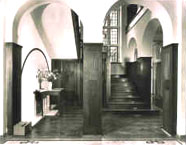|
 |
 |
 |
 |
 |
 |
 |
 |
 |
 |
 |
 |
 |
Political Intelligence Department
|
|
 |
 |
|
|
|
|
|
|
|
|
|
|
 |
|
|
|
|
To begin his duties with the Political Intelligence Department, four days after the outbreak of war, as per his instructions Robert Bruce Lockhart reported to the Foreign Office. As with the rest of the staff, however, this would be on a somewhat insubstantial salary. He was told he would not actually be required until September 10th. and so on that day, a Sunday, he duly received the details of his employment, together with the news that he would be accommodated ‘in the country’.
He consequently took the afternoon train to Dunstable and there, to collect him by car, was met by Reginald Leeper, who explained something about the nature of the work, as they drove to the P.I.D. headquarters. This was a small red brick villa on the Woburn estate, close to the gates of Woburn Park and the situation had been |
|
 |
 |
|
|
 |
'Foxgrove' was probably a code-name for Froxfield, the early home of P.I.D.
|
|
|
 |
dictated by Leeper’s additional role as Foreign Office advisor, to the secret propaganda organisation at Woburn Abbey, which he had to be near. Leeper had arranged the service of many experts, for each country or group of countries that P.I.D. had to deal with and already in residence amongst this personnel Lockhart found E.L. Woodward, the Oxford historian, George Martelli and Chris Warner of the Foreign Office. No domestic staff had yet arrived and the house, having once been the home of Lady Ampthill, was barely of suitable proportions. Not least of discomforts were the confines of an attic bedroom cum study, which lacked even the space to store his clothes.
Towards the evening Leeper took him for a stroll around the ducal park, an occasion made all the more interesting by the collection of exotic animals that were allowed to roam the acreage.
At ‘Foxgrove’, as the P.I.D. house was named, Lockhart learned that Woodward was to be the German expert although he later resigned, through what he considered to be an almost total merger with Electra House. Martelli, who had written a book on the Mediterranean, was deemed to be the Italian expert and Warner would be Leeper’s Foreign Office assistant, acting for him in his absence. Sir Kinahan Cornwallis later joined the staff, as the expert on the Middle East. |
|
 |
Lockhart was to deal with Central Europe and the Balkans, excepting Germany and Austria and as such had to maintain regular relations with the embassies and legations of those countries. This entailed the preparation of special memorandums for the Foreign Office and also the writing of a weekly review of his countries, for a secret Political Summary which, Leeper hoped, would serve as official guidance to other departments. For the weekly intelligence summary Lockhart’s contribution had to be delivered by a fixed timetable and usually comprised around 2000 words. The finished report would then go to the relevant Foreign Office political departments, for approval.
The restrictions of Foxgrove soon caused a transfer of the department, within a week, to the more spacious realms of Marylands which although ‘not bad as a building, for it |
|
|
|
|
 |
|
 |
|
|
 |
|
His P.I.D. duties meant that Robert Bruce Lockhart had to divide his time between Marylands and London, where he took a room in the Capital's clubland.
|
|
|
 |
is well lighted and well situated’ still caused problems of accommodation. ‘We will be an awful scrum, and there will be about 6 wives, daughters, etc. ----- Unless I can get a writing table for my bedroom I shall go mad.’ Every morning Lockhart arose early and making his own tea did most of his writing before breakfast. The rest of the day was then taken up by meetings and planning.
For his convenience, in the liaison with his various contacts, having so many countries to administer he duly took a room at his London club and thereon spent three and a half days in London and three and a half at Marylands. On his London visits, after the round of the Balkan visitors he would then routinely call at the Foreign Office, for an exchange of information. The superintending Under Secretaries of the two departments – the Southern and the Central - that controlled Lockhart’s work were Sir Orme Sargent and William Strang and both disapproved strongly of a Foreign Office department being so remote in the Bedfordshire countryside! The Foreign Office also appointed Lockhart as the liaison officer with Eduard Benes and the exiled Czech Government in Britain although he was still expected to continue his duties with P.I.D.
As for P.I.D., apparently harmonious with the mood of the staff moves were shortly put in hand for a transfer of the Department back from the rural obscurity to London and on August 19th., 1940, Lockhart wrote his last summary at Marylands. He was to leave on the Thursday, the same day as the heavy luggage, whilst the rest of the staff were to follow the next day. |
|
|
 |
 |
|
‘Sunless’ being the word describing their new office, situated in Lansdowne House, Fitzmaurice Place, W.1., some of the staff – Leeper, Valentine Williams and Brooks – at least had armchairs! However, in a contradiction to this recent move Leeper went to see Dalton, seeking approval for his suggestion that P.I.D. should return to ‘the country’, which he deemed more conducive ‘for thinking’. Conducive or not, P.I.D. periodically issued as part of it’s duties ‘Propaganda Nuggets’, which was devoted mostly to forecasts and assertions made by the Nazis and Hitler that had not been fulfilled.
Yet for Lockhart, London would become a place of permanent residence since during the previous month he had accepted Hugh Dalton’s invitation to become the British Representative with the |
|
|
 |
Marylands interior. Today Marylands is used as a residential college.
|
|
|
|
 |
Czech Provisional Government. For this reason he took a small flat in Duke of York Street and when this was bombed out then moved to the East India and Sports Club. Despite his new role Lockhart still continued to write the Balkan section of the P.I.D. weekly summary and he also attended the Saturday meetings of the propaganda organisation, at Woburn.
As for P.I.D., in March ,1942, a decision to abolish the post of a B.B.C. Liaison Officer with the Department was made, at Leeper’s suggestion, and in April ,1943, came the disbanding of the organisation itself. Most of the members were transferred to a new Foreign Office Research Department at Balliol College, Oxford, which took on the work of producing the weekly intelligence summaries although as a cover the Political Warfare Executive continued to use the name and initials of P.I.D., until some months after the war, now operating openly. Documents relating to the Political Intelligence Department may be found in both the Public Record Office and the Hoover Library. |
|
|
 |
|
|
|
|
|
Back to top |
|
|
|
|
|
